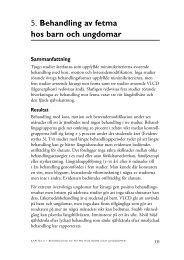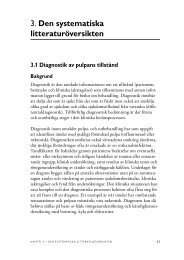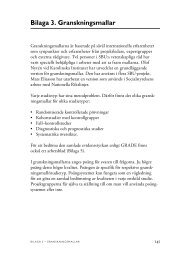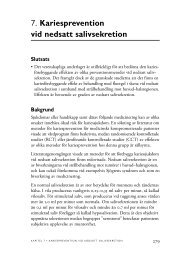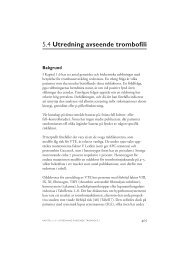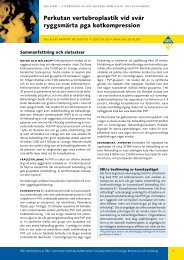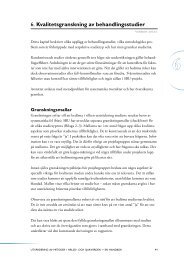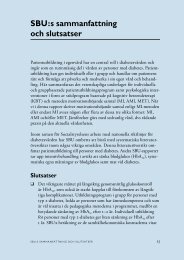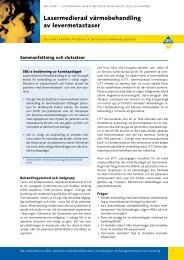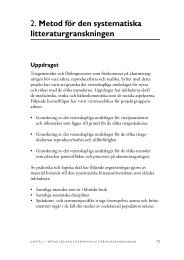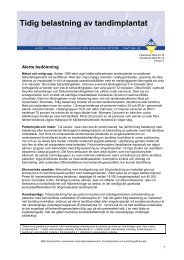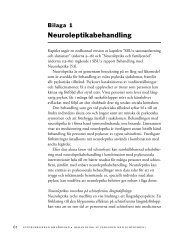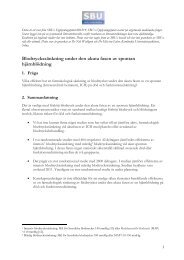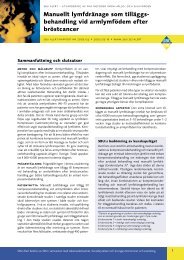- Page 1 and 2:
Autismspektrumtillstånd Diagnostik
- Page 3:
Projektgrupper Autismspektrumtillst
- Page 6 and 7:
Sammanfattande resultattabeller 91
- Page 8 and 9:
4. Systematisk litteraturöversikt
- Page 10 and 11:
9. Kunskapsluckor och framtida fors
- Page 13 and 14:
SBU:s sammanfattning och slutsatser
- Page 15 and 16:
SBU:s slutsatser Instrument för ut
- Page 17 and 18:
vid testsituationen. Denna typ av k
- Page 19 and 20:
Faktaruta 2 Mått på diagnostisk t
- Page 21 and 22:
Autism Diagnostic Observation Sched
- Page 23 and 24:
Childhood Autism Rating Scale (CARS
- Page 25 and 26:
stereotypa beteenden med Aberrant B
- Page 27 and 28:
• Det finns otillräckligt vetens
- Page 29 and 30:
Biverkningar Barn och ungdomar •
- Page 31 and 32:
• Det finns vetenskapligt stöd f
- Page 33 and 34:
vad gäller definition och avgräns
- Page 35 and 36:
Tidig intervention till små barn
- Page 37:
utinbeteenden. Syskon och föräldr
- Page 40 and 41:
eteendemodifikationer och socialt s
- Page 42 and 43:
Faktaruta 1.1 Diagnoskriterier för
- Page 44 and 45:
Faktaruta 1.1 fortsättning C. Den
- Page 46 and 47:
Faktaruta 1.1 fortsättning Atypisk
- Page 48 and 49:
Faktaruta 1.1 fortsättning Autism,
- Page 50 and 51:
Faktaruta 1.2 fortsättning B. För
- Page 52 and 53:
ningar ofta identifieras mycket tid
- Page 54 and 55:
ideellt sammansatta grupper, som vi
- Page 56 and 57:
Avsnitten om patientens delaktighet
- Page 58 and 59:
• Hur uppfattar patienter med AST
- Page 61 and 62:
2. Metodbeskrivning Litteratursökn
- Page 63 and 64:
Figur 2.1 Flödesschema för litter
- Page 65 and 66:
Negativt prediktivt värde (NPV) an
- Page 67 and 68:
Evidensstyrkan graderas i fyra niv
- Page 69 and 70:
Kvalitativ studiedesign I avsnittet
- Page 71 and 72:
Följande kriterier avgjorde vilken
- Page 73 and 74:
Tabell 2.1 Tabell över tredje niv
- Page 75 and 76:
Tabell 2.1 fortsättning Ämnesomr
- Page 77:
16. Benderix Y, Nordstrom B, Sivber
- Page 80 and 81:
80 Autismspektrumtillstånd - diAgn
- Page 82 and 83:
syndrom, Aspergers syndrom, atypisk
- Page 84 and 85:
Faktaruta 3.1.1 Utvärderade instru
- Page 86 and 87:
Faktaruta 3.1.2 Diagnostik vid AST.
- Page 88 and 89:
Faktaruta 3.1.3 fortsättning Diagn
- Page 90 and 91:
nosen autistiskt syndrom med DSM-IV
- Page 92 and 93:
Tabell 3.1.4 Sammanfattande resulta
- Page 94 and 95:
ADI-R Tabell 3.1.8 Sammanfattande r
- Page 96 and 97:
Frågor 1. Vad är tillförlitlighe
- Page 98 and 99:
offnivå på 11 erhölls en sensiti
- Page 100 and 101:
nos enligt ICD-10-kriterier baserad
- Page 102 and 103:
använts, tillsammans gav kliniskt
- Page 104 and 105:
CARS. Flertalet av de 234 studier s
- Page 106 and 107:
Tabell 3.1.12 fortsättning Instrum
- Page 108 and 109:
Table 3.1.13 ADI-R and ADOS. Author
- Page 110 and 111:
Table 3.1.13 continued Author Year
- Page 112 and 113:
Table 3.1.13 continued Author Year
- Page 114 and 115:
Table 3.1.14 ASSQ. Author Year Refe
- Page 116 and 117:
Table 3.1.15 continued Author Year
- Page 118 and 119:
Table 3.1.17 SCQ. Author Year Refer
- Page 120 and 121:
Table 3.1.17 continued Author Year
- Page 122 and 123:
Table 3.1.18 continued Author Year
- Page 124 and 125:
14. Wing L, Leekam SR, Libby SJ, Go
- Page 126 and 127:
3.2 Insatser vid AST Slutsats ❑
- Page 128 and 129:
Tabell 3.2.1 Utvärderade metoder.
- Page 130 and 131:
Vi har gått igenom forskningen av
- Page 132 and 133:
3.2.1 Tidig intervention Bakgrund I
- Page 134 and 135:
Tabell 3.2.3 Sammanfattande resulta
- Page 136 and 137:
skoleinsatser [6]. Man såg större
- Page 138 and 139:
Faktaruta 3.2.1 fortsättning Allm
- Page 140 and 141:
jämfört med tidigare. Inlärnings
- Page 142 and 143:
I en retrospektiv multicenterstudie
- Page 144 and 145:
större framsteg för de barn som h
- Page 146 and 147:
Reichow och medarbetare sammanfatta
- Page 148 and 149:
den variabel som bäst korrelerar m
- Page 150 and 151:
De 102 barn som får mindre specifi
- Page 152 and 153:
Table 3.2.5 continued Author Year R
- Page 154 and 155:
Table 3.2.5 continued Author Year R
- Page 156 and 157:
Table 3.2.5 continued Author Year R
- Page 158 and 159:
Table 3.2.6 continued Author Year R
- Page 160 and 161:
Table 3.2.6 continued Author Year R
- Page 162 and 163:
Table 3.2.6 continued Author Year R
- Page 164 and 165:
Table 3.2.6 continued Author Year R
- Page 166 and 167:
Table 3.2.6 continued Author Year R
- Page 168 and 169:
Effekter på associerade problem
- Page 170 and 171:
PECS Tabell 3.2.9 Sammanfattande re
- Page 172 and 173:
Frågor 1. Ger följande behandling
- Page 174 and 175:
Faktaruta 3.2.2 fortättning Dators
- Page 176 and 177:
I en randomiserad kontrollerad stud
- Page 178 and 179:
Träning av social förmåga Olika
- Page 180 and 181:
KAPITEL 3 • sysTEmATIsK LITTErATu
- Page 182 and 183:
Table 3.2.11 continued Author Year
- Page 184 and 185:
Table 3.2.13 Social skills. Author
- Page 186 and 187:
Table 3.2.14 continued Author Year
- Page 188 and 189:
3.2.3 Psykologiska och psykoterapeu
- Page 190 and 191:
Tabell 3.2.17 Sammanfattande result
- Page 192 and 193:
cinering [76]. Totalt deltog 124 ba
- Page 194 and 195:
Table 3.2.18 CBT and core symptoms.
- Page 196 and 197:
Table 3.2.20 CBT and medication. Au
- Page 198 and 199:
Sammanfattande resultattabeller Glu
- Page 200 and 201:
Vitamin B12 Tabell 3.2.24 Sammanfat
- Page 202 and 203:
Beskrivning av studier och resultat
- Page 204 and 205:
en dietstudie på ett sätt som är
- Page 206 and 207:
att bedömningen inte var blindad o
- Page 208 and 209:
Table 3.2.26 Omega 3 fatty acids. A
- Page 210 and 211:
3.2.5 Övriga interventioner Bakgru
- Page 212 and 213:
Evidensgraderade resultat • Det f
- Page 214 and 215:
Referenser 1. Helt M, Kelley E, Kin
- Page 216 and 217:
29. Sallows GO, Graupner TD. Intens
- Page 218 and 219:
autism? New York: Plenum Press; 199
- Page 220 and 221:
Knapp J, Sinclair L. Effectiveness
- Page 222 and 223:
Sensory integration therapy for aut
- Page 224 and 225:
språk mätt med Aberrant Behavior
- Page 226 and 227:
Tabell 3.3.1 fortsättning Effektm
- Page 228 and 229:
Resultat av litteratursökningen Vu
- Page 230 and 231:
Diskussion Tre studier tillämpar t
- Page 232 and 233:
Table 3.3.2 Treatment with risperid
- Page 234 and 235:
Referenser 1. McCracken JT, McGough
- Page 236 and 237:
Bakgrund Vi har valt att se på fr
- Page 238 and 239:
Faktaruta 4.1 fortsättning Lag om
- Page 240 and 241:
Faktaruta 4.2 Organisationer som ä
- Page 242 and 243:
Faktaruta 4.2 fortsättning Kommun
- Page 244 and 245: Inklusionskriterier Vi inkluderade
- Page 246 and 247: Värde av stödinsatser till person
- Page 248 and 249: Referenser 1. Rowlandson PH, Smith
- Page 250 and 251: Evidensgraderade resultat • Det f
- Page 252 and 253: Tabell 5.3 Andra nivåns tema: Ensa
- Page 254 and 255: Tabell 5.5 Andra nivåns tema: Kont
- Page 256 and 257: Tredje nivåns tema: Utsatthet och
- Page 258 and 259: Tabell 5.11 Andra nivåns tema: Omv
- Page 260 and 261: Kvalitativ analysmetod Beskrivning
- Page 262 and 263: Tabell 5.12 Första, andra och tred
- Page 264 and 265: Beskrivning av studier och resultat
- Page 266 and 267: Kommentar till analysen Analysen ba
- Page 268 and 269: Ensamhet, begränsat stöd, såväl
- Page 270 and 271: Tabell 5.16 fortsättning Första n
- Page 272 and 273: Tabell 5.16 fortsättning Första n
- Page 274 and 275: negativt. Oron för syskonen är en
- Page 276 and 277: ”However, autistics don’t ‘su
- Page 278 and 279: ”The bigger transition, the bigge
- Page 280 and 281: Kommentar till analysen Analysen ba
- Page 282 and 283: Tabell 5.19 Tredje nivåns tema. Tr
- Page 284 and 285: Förväntningar motsvaras inte Läk
- Page 286 and 287: 6 200 familjer med hemmavarande bar
- Page 288 and 289: intensiv beteendeterapi och föräl
- Page 290 and 291: Den första gruppens egna upplevels
- Page 292 and 293: Table 5.21 Qualitative method. Auth
- Page 296 and 297: Table 5.21 continued Author Year Re
- Page 298 and 299: Table 5.21 continued Author Year Re
- Page 300 and 301: Table 5.21 continued Author Year Re
- Page 302 and 303: Table 5.21 continued Author Year Re
- Page 304: and their children with autism: an
- Page 307 and 308: gritet och ett rättvist omhändert
- Page 309 and 310: deringar och att kunskapsunderlaget
- Page 311 and 312: lagar komma i konflikt med tekniken
- Page 313 and 314: heller specifikt vill man kanske f
- Page 315 and 316: Flera etiska krav har ställts upp
- Page 317 and 318: Att man på sina håll inte erbjude
- Page 320 and 321: 7. Hälsoekonomi Evidensgraderade r
- Page 322: Referenser 1. Järbrink K. The econ
- Page 325 and 326: Diagnostiskt finns ett brett spektr
- Page 327 and 328: detta område. I vår genomgång ha
- Page 330 and 331: 9. Kunskapsluckor och framtida fors
- Page 332 and 333: Kunskapslucka 3. Kunskapen om effek
- Page 334: 9.3 Kunskapsluckor - Patientens del
- Page 337 and 338: AST Autismspektrumtillstånd Autono
- Page 339 and 340: Exklusion Omständigheter som förh
- Page 341 and 342: Livskvalitet En persons syn på sit
- Page 343 and 344: RAADS-R Ritvo Autism Asperger Diagn
- Page 345 and 346:
TMS Transkraniell magnetstimulering
- Page 347 and 348:
Martin Grann Adjungerad professor,
- Page 349 and 350:
Projektgrupp organisation inom psyk
- Page 351 and 352:
Rurik Löfmark Docent, leg läkare,
- Page 353 and 354:
Rapporter publicerade av SBU Gula r
- Page 355:
Screening för bukaortaanerysm, nr



